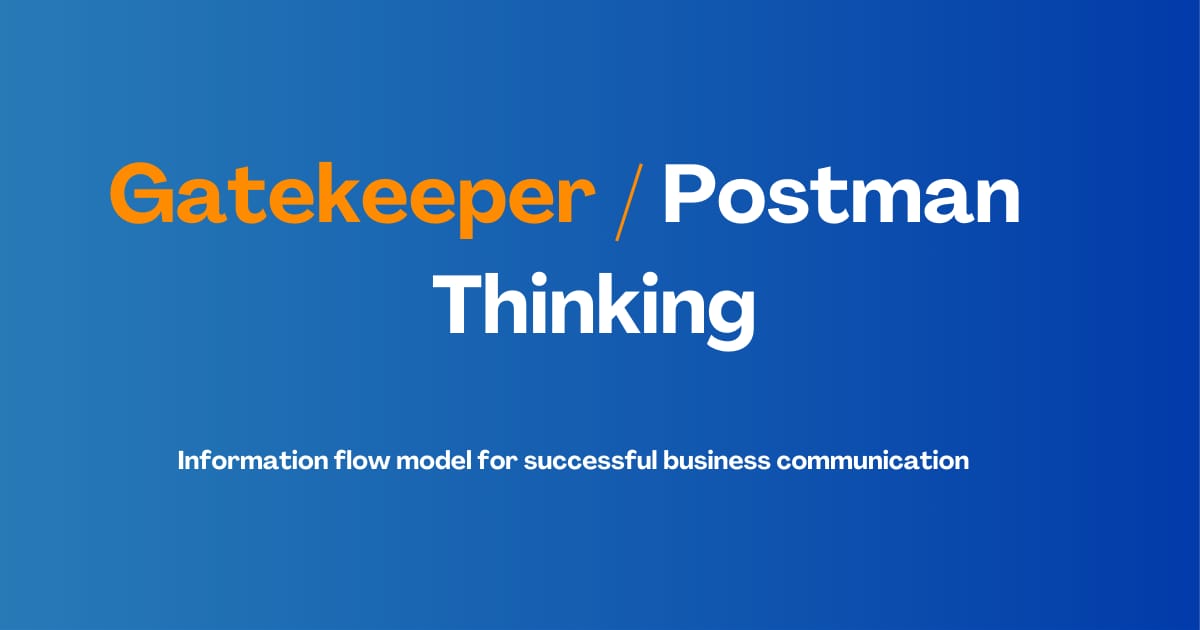
In my journey of building and scaling startups, I’ve discovered a fundamental truth: how information flows within a company can either propel it forward or cause its downfall. This led me to develop a strategic approach—Postman Thinking vs. Gatekeeper Thinking—which has transformed how my teams operate and make decisions.
The Difference Between Postman and Gatekeeper Thinking
Postman Thinking
A postman (or courier) is a messenger, passing along information without questioning or filtering it. They execute but do not evaluate. In the business world, this translates to employees who simply relay messages, forward emails, and move tasks without verifying their accuracy or impact.
Now, imagine if this postman were carrying a hazardous package or, worse, a bomb—without checking, they would still pass it along. The same happens in organizations when unchecked information, half-baked ideas, or poor decisions get passed on without scrutiny.
Gatekeeper Thinking
A gatekeeper, however, is someone who verifies, curates, and ensures that only the right information flows forward. They don’t just act as a middleman; they assess, refine, and make strategic calls about what should and should not move ahead.
In my teams, gatekeeper thinking means ownership and accountability. It means people don’t just forward messages but evaluate their relevance and accuracy first. This ensures that every decision is informed, every action is intentional, and every outcome is optimized.
Why Gatekeeper Thinking is Essential for Startups
Startups operate in a fast-paced, high-stakes environment where one poor decision can derail momentum. Here’s why I built a culture of gatekeeper thinking within my companies:
1. Prevents the Spread of Misinformation
Speed is important, but precision is non-negotiable. If everyone blindly shares information, confusion and mistakes multiply.
Employees who act as gatekeepers validate data before sharing, ensuring clarity and accuracy.
2. Enhances Decision-Making
Gatekeepers don’t just accept things at face value. They challenge assumptions, analyze risks, and make informed calls.
They help prevent hasty decisions based on incomplete or incorrect information.
3. Enhances Team Collaboration
Instead of mindlessly forwarding tasks, we ask: Is this the right move? Is there a better way?
This fosters deeper conversations and drives innovation within teams.
4. Improves Quality and Output
When everyone in the organization adopts gatekeeper thinking, high standards become the norm.
Whether it’s code, marketing, or strategy, every deliverable is thoroughly vetted before being released.
Balancing Speed and Scrutiny
While gatekeeping is crucial, startups must not become paralyzed by over-analysis. Agility remains key.
Here’s how I structure decision-making:
For high-impact decisions (strategy, hiring, partnerships) – a strong gatekeeper approach is mandatory.
For low-impact, iterative tasks (routine operations, brainstorming) – postman thinking is encouraged to maintain momentum.
Final Thoughts
A startup’s success is not just about speed—it’s about speed with precision. If everyone acts as a postman, inefficiencies and errors grow unchecked. However, when teams embrace gatekeeper thinking, only the best information, ideas, and decisions move forward.
By fostering a culture where employees critically evaluate what they pass along, startups can significantly improve decision-making, collaboration, and overall business outcomes. So next time you handle information in your company, ask yourself: Am I acting as a postman or a gatekeeper?
How to build a gatekeeper thinking in the organization?
Subscribe to my newsletter! I will share my experiments in future blogs.
I’d love to hear your thoughts. Have you implemented gatekeeper thinking in your startup? Let’s discuss in the comments!

